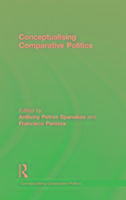Conceptualising Comparative Politics
BücherAngebote / Angebote:
A recent collection of interviews with some of the most influential scholars in comparative politics highlights their intellectual broadness, the political commitments and the 'passions'. It misses a rather important point: the fundamental contribution of all was based on conceptual innovation and redefinition in relation to empirical content. Unfortunately, too much comparative politics involves testing of hypotheses using new methodological approaches without giving sufficient attention to the concepts which are fundamental to hypotheses, particularly the ability of these concepts to 'travel.' Conceputalising Change in Comparative Politics breaks new ground by emphasizing the role of thoroughly thinking through concepts via other academic literature and deep familiarity with the cases that inform this conceptual reflection. In this thought provoking book, established academic experts as well emerging scholars in the field, collect (and invite) scholarship in the tradition of conceptual comparative politics by first identifying the tradition and then explaining how scholarship in this tradition uses concepts in one of three ways.
Concepts may be used as 'lenses', as 'building blocks' and as 'scripts'. Importantly, Conceptual Comparative Politics does not simply involve using concepts in one of three ways but it applies concepts with careful consideration of empirical variation. The chapters address some of the most contentious issues in comparative politics (populism, state capacity, governance, institutions, elections, secularism, among others) from various geographic regions and model how scholars doing comparative politics might approach such subjects. Conceputalising Change in Comparative Politics will challenge you to think of other potential ways to engage in conceptual comparative inquiry and employ you with various methodologically sound techniques to understand and explain comparative politics.
Lieferbar in ca. 10-20 Arbeitstagen
